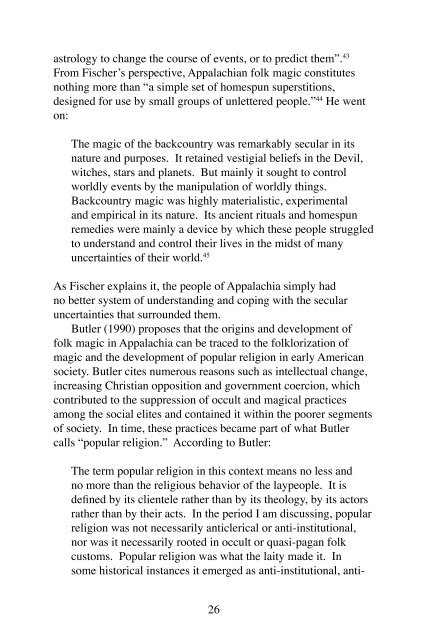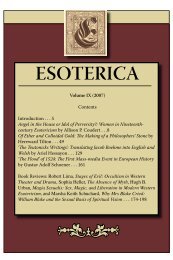Download - Esoterica - Michigan State University
Download - Esoterica - Michigan State University
Download - Esoterica - Michigan State University
You also want an ePaper? Increase the reach of your titles
YUMPU automatically turns print PDFs into web optimized ePapers that Google loves.
astrology to change the course of events, or to predict them”. 43<br />
From Fischer’s perspective, Appalachian folk magic constitutes<br />
nothing more than “a simple set of homespun superstitions,<br />
designed for use by small groups of unlettered people.” 44 He went<br />
on:<br />
The magic of the backcountry was remarkably secular in its<br />
nature and purposes. It retained vestigial beliefs in the Devil,<br />
witches, stars and planets. But mainly it sought to control<br />
worldly events by the manipulation of worldly things.<br />
Backcountry magic was highly materialistic, experimental<br />
and empirical in its nature. Its ancient rituals and homespun<br />
remedies were mainly a device by which these people struggled<br />
to understand and control their lives in the midst of many<br />
uncertainties of their world. 45<br />
As Fischer explains it, the people of Appalachia simply had<br />
no better system of understanding and coping with the secular<br />
uncertainties that surrounded them.<br />
Butler (1990) proposes that the origins and development of<br />
folk magic in Appalachia can be traced to the folklorization of<br />
magic and the development of popular religion in early American<br />
society. Butler cites numerous reasons such as intellectual change,<br />
increasing Christian opposition and government coercion, which<br />
contributed to the suppression of occult and magical practices<br />
among the social elites and contained it within the poorer segments<br />
of society. In time, these practices became part of what Butler<br />
calls “popular religion.” According to Butler:<br />
The term popular religion in this context means no less and<br />
no more than the religious behavior of the laypeople. It is<br />
defined by its clientele rather than by its theology, by its actors<br />
rather than by their acts. In the period I am discussing, popular<br />
religion was not necessarily anticlerical or anti-institutional,<br />
nor was it necessarily rooted in occult or quasi-pagan folk<br />
customs. Popular religion was what the laity made it. In<br />
some historical instances it emerged as anti-institutional, anti-<br />
26



